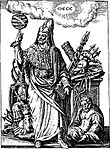
Back Hermetisme Afrikaans هرمسية Arabic Hermetizm Azerbaijani Херметизъм Bulgarian Hermetizam BS Hermetisme Catalan Hermetismus Czech Hermetigiaeth Welsh Hermetisme Danish Hermetik German
| Part of a series on |
| Hermeticism |
|---|
 |
Hermeticism, or Hermetism, is a philosophical and religious tradition rooted in the teachings attributed to Hermes Trismegistus, a syncretic figure combining elements of the Greek god Hermes and the Egyptian god Thoth.[a] This system encompasses a wide range of esoteric knowledge, including aspects of alchemy, astrology, and theurgy, and has significantly influenced various mystical and occult traditions throughout history. The writings attributed to Hermes Trismegistus, often referred to as the Hermetica, were produced over a period spanning many centuries (c. 300 BCE – 1200 CE) and may be very different in content and scope.[b]
One particular form of Hermetic teaching is the religio-philosophical system found in a specific subgroup of Hermetic writings known as the 'religio-philosophical' Hermetica. The most famous of these are the Corpus Hermeticum, a collection of seventeen Greek treatises written between approximately 100 and 300 CE, and the Asclepius, a treatise from the same period, mainly surviving in a Latin translation.[c] This specific historical form of Hermetic philosophy is sometimes more narrowly referred to as Hermetism,[d] to distinguish it from other philosophies inspired by Hermetic writings of different periods and natures.
The broader term, Hermeticism, may refer to a wide variety of philosophical systems drawing on Hermetic writings or other subject matter associated with Hermes. Notably, alchemy often went by the name of "the Hermetic art" or "the Hermetic philosophy".[1] The most famous use of the term in this broader sense is in the concept of Renaissance Hermeticism, which refers to the early modern philosophies inspired by the translations of the Corpus Hermeticum by Marsilio Ficino (1433–1499) and Lodovico Lazzarelli (1447–1500), as well as by Paracelsus' (1494–1541) introduction of a new medical philosophy drawing upon the 'technical' Hermetica, such as the Emerald Tablet.[2]
Throughout its history, Hermeticism was closely associated with the idea of a primeval, divine wisdom revealed only to the most ancient of sages, such as Hermes Trismegistus.[e] During the Renaissance, this evolved into the concept of prisca theologia or "ancient theology", which asserted that a single, true theology was given by God to the earliest humans and that traces of it could still be found in various ancient systems of thought.[3] This idea, popular among Renaissance thinkers like Giovanni Pico della Mirandola (1463–1494), eventually developed into the notion that divine truth could be found across different religious and philosophical traditions, a concept that came to be known as the perennial philosophy.[4] In this context, the term 'Hermetic' gradually lost its specificity, eventually becoming synonymous with the divine knowledge of the ancient Egyptians, particularly as related to alchemy and magic, a view that was later popularized by nineteenth- and twentieth-century occultists.[5]
Cite error: There are <ref group=lower-alpha> tags or {{efn}} templates on this page, but the references will not show without a {{reflist|group=lower-alpha}} template or {{notelist}} template (see the help page).
- ^ Ebeling 2007, pp. 103–108.
- ^ Ebeling 2007, pp. 59–90.
- ^ Walker 1972.
- ^ Hanegraaff 2012, pp. 7–12.
- ^ Prophet 2018; Horowitz 2019, pp. 193–198.